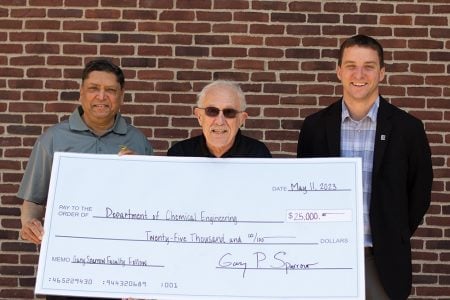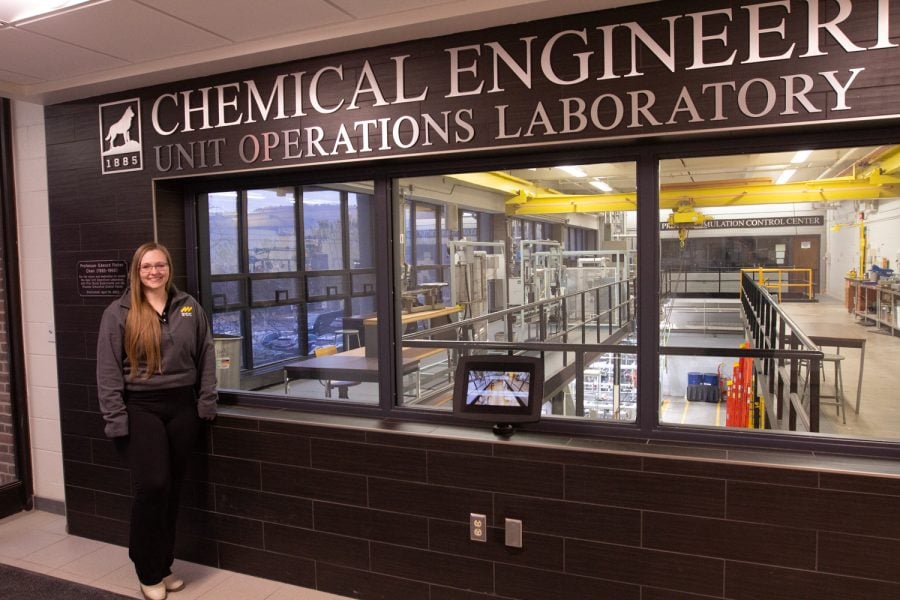Jeana Collins ’16 ’18 is an associate teaching professor in the Department of Chemical Engineering and the Gary Sparrow Endowed Faculty Fellow. Her position is made possible by a gift from Gary Sparrow ’70 and impacts many students she teaches and leads in the Unit Operations Lab. Below is a Q&A with Collins.
What are your responsibilities?
My responsibilities in the Chemical Engineering Department are teaching and service. This year, I am teaching the senior capstone laboratory sequence (Unit and Plant Operations), Computer-Aided Problem Solving (a chemical-engineering elective class), a new elective on programming in DeltaV (the distributed control system that we use in the UO lab; DeltaV is widely used in industry), and Material and Energy Balances (summer class). I also serve on and chair multiple committees within the department, as well as advise the Dance Team and AIChE student organizations.
Tell us about your background and how you came to teach at Michigan Tech.
I received my B.S. in Chemical Engineering from the University of Minnesota Duluth in 2012 and came to Michigan Tech for graduate school. I completed my M.S. and Ph.D. in Chemical Engineering at Michigan Tech. During my graduate studies, I was also a graduate teaching assistant (GTA) for a variety of classes. I really enjoyed being a GTA, and found that I wanted to pursue a career in academics, focused on teaching instead of research. I joined the department as faculty in 2016.
Why is your position important?
Instructional track faculty are important because of our focus on undergraduate education. Because we are focused on teaching, we have higher teaching loads and can reduce the amount of teaching needed from research faculty. We can also take on classes that require more time than traditional classes. For example, the senior capstone lab requires 16+ hours a week in the lab with the students.
What does holding an endowed position mean to you?
I am honored to be the first Gary Sparrow Endowed Faculty Fellow. I feel that an instructional track endowed position really shows how much the Department and University care about undergraduate education. This position will provide more opportunities for me to go to workshops/training and conferences to continuously improve our program and share knowledge. For example, over the summer, I completed a week-long training on DeltaV at the Emerson Training Center in Round Rock, Texas. That training expanded my knowledge of DeltaV. I am using that to create a new elective course that I am offering for the first time this spring. The course will be focused on the DeltaV software. All of the chemical engineering students operate equipment with DeltaV in the capstone lab sequence, but this new elective will delve more into process and process control engineers’ roles with DeltaV in industry. With the endowed position, I will be able to continue expanding my knowledge and improving my classes, both core and elective.

What takes place in the Unit Ops lab?
The Unit Operations Lab provides a hands-on education for students. Students first enter the lab in lower-level classes to look at real equipment and potentially see equipment relevant to their coursework operating (for example, the CM 3240 students come in to learn about distillation on the glass distillation unit so that they can see what is happening inside of a distillation column while they are learning about distillation in class). The first class that they operate equipment is during their junior year during their process control course. In process control, the students apply what they have been learning in lecture in the lab. In the UO lab, they complete step tests and tuning on a controller for the heat transfer experiment, are introduced to DeltaV (our distributed control system) on the flow measurement experiment, and tune a cascade control loop on the three-story distillation column. In their senior year, the students run multiple (at least four) of the unit operation experiments, as well as both of the pilot plants, applying concepts from all previous chemical engineering classes. For the pilot plant operations, multiple groups work together to operate the equipment. They get to experience shift changes, radio communication between the control room and floor, manual and automated operations, troubleshooting, and more. Safety is a huge part of the UO lab. A safety inspection, including asking other students safety questions, is completed every run day, each group has a safety check every run day before operating equipment, students prepare safety moments for each other, and we have a reporting system PAWS (prevent accidents with safety). PAWS is a comprehensive safety program that requires training, constant vigilance, and incident reporting and documentation, all with an eye toward critical review and continuous improvement.
How does the Unit Ops lab impact students and their futures?
The UO lab provides students with valuable hands-on experience that translates to their careers. They gain experience operating equipment, troubleshooting, communicating via radio, DeltaV, and safety culture, as well as experimental design and statistics. We also coordinate with industry representatives to teach the students about how the equipment relates to their industry. The students are able to draw upon their experiences in the UO lab when talking to recruiters (during career fair / during interviews).
Any specific stories of unique research or successes from the lab?
There is no research in the UO lab; it is only a teaching lab. When giving tours and discussing the lab with industry representatives/recruiters, they have been impressed with the experiences that the students are getting and the equipment that they are running.
What students have to say about the Unit Operations Lab:
To me, the Unit Operations lab offers the invaluable experience to put what we learn in the classroom into the perspective of an industrial environment, while still having the opportunity to make mistakes and grow from them. Being able to work on the floor and as a console operator not only helps us to cement our understanding of the technical aspects of our future positions, but to also foster an appreciation for the daily tasks and positions that make up a successful plant.
As a senior chemical engineering student with 15 months of hands-on experience in chemical manufacturing facilities, my time at the UO Lab at MTU has provided me with a unique opportunity. It allows me to operate industry-relevant equipment within a classroom environment. This experience is incredibly valuable as it bridges the gap between theoretical knowledge and practical application. In the UO Lab, students have the freedom to ask questions and learn from their mistakes, making it an essential resource for those who lack industry experience. Ultimately, the UO Lab plays a crucial role in enhancing students’ practical understanding before they graduate.
The UO lab at Tech has provided me with experiences that have reinforced the theory and knowledge that we as students spend so much time developing throughout the entire chemical engineering curriculum. Those experiences create the industrial feel and give our students a head start over our peers as we enter into the industrial world.
